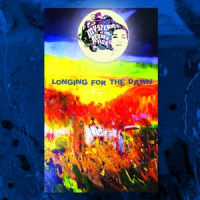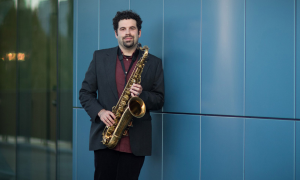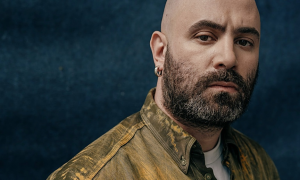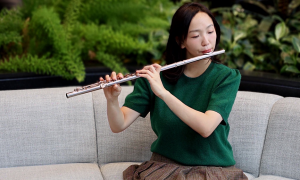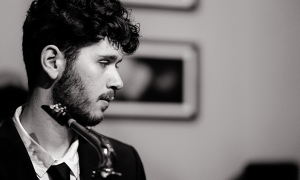Home » Jazz Articles » Take Five With... » Take Five with Monday Michiru
Take Five with Monday Michiru

Meet Monday Michiru
Since her solo album debut in 1991, songstress-flutist Monday Michiru has released albums on an annual basis both as a soloist and collaborator. Known as one of the pioneers of the Japanese acid jazz movement and boasting countless dance floor and radio hits worldwide, Monday's compositional style and repertoire has evolved to that which is undeniably hers, with reflections of jazz, soul, Brazilian, folk and other urban and world flavors.Born in Tokyo, Japan to jazz musicians Toshiko Akiyoshi and Charlie Mariano, and raised bicoastally in the U.S. by Akiyoshi and tenor sax/flutist Lew Tabackin, Monday Michiru, so named to reflect both her Japanese and American-Italian heritage, started music classically on flute, studying at Interlochen Arts Academy on scholarship, gravitating later to vocals, composition and production. A surprise turn to acting in 1987 garnered her a Best New Actress award by the Japan Film Academy, prompting a move to Japan where she furthered her career both in film and music. By 2000, when Monday moved back to New York, the list of her album releases and headlining performances worldwide was already long, yet her prolific output showed no signs of slowing down. Her compositional explorations have led her to a more expressive and mature style that is an organic growth from her roots.
Today Monday continues to live and perform in New York while touring often to Japan, and leads a lyric writing workshop "Lyricize."
Instruments:
Vocal and flute. Can the pen be considered an instrument (to write)? If so, I am super partial to Uni-ball Vision Elite. I swear the lyrics write themselves (as if... ).Teachers and/or influences?
I still remember my first flute teacher, Mr. Canter, who used to teach from a music shop in the Valley where we lived in L.A., I think on Ventura Boulevard. I studied with him for a year or two and just adored him, and I knew he really loved teaching me, was so incredibly encouraging and made me feel like I was going to be the greatest flutist ever. I think that kind of encouragement is so valuable to a beginner student. The name of the flute teacher I had next escapes me, but she was great, much more strict and sparse with compliments—she made me work! I remember we had an interesting debate that stayed with me, about what playing the flute meant to me. For me, it was all about the emotions and being able to pour it into my playing. She rebutted, saying it should be about playing to elicit emotions from the listener. Back then I thought it was so cold and calculating, like manipulating the outcome rather than being authentic to expression. I still think that I guess, but I understand what she meant.As for influences, there are so many!! My earliest influences musically were Michael Jackson, Carol King, Stevie Wonder and Steely Dan. There was a period I was a total Chick Corea geek and must have worn out the vinyl listening over and over again to Light as a Feather. Flora Purim's voice was so interesting to me— not jazz, modern but also classical at the same time, she used her voice as an instrument that integrated with the sonics of the band rather than in the forefront as was traditionally thought of for vocalists, just conceptually different. It wasn't until decades later that I got into Brazilian music while living in Japan during the '90s that I was introduced to so many great Brazilian artists such as Milton Nascimento, Joyce, and so many others, and that really changed the stylistic landscape for me in how I perceived harmonics and where the melody lay, not to mention rhythmically. Of course as with any young person, I listened avidly to the pop of my time like new wave in the early-mid '80s, ska and reggae, got into Afro-soul for a bit (Fela Kuti, King Sunny Ade, Manu Dibango, etc.), hip hop since the early-mid '80s into the 90s. The London underground club scene from the late '80s into the '90s was of huge interest to me. I always seemed to gravitate to what felt authentic to me, not just genre-wise but in its intent and expression, and also a little minor and just under the radar and brimming with energy.
I knew I wanted to be a musician when...
I started playing and knew instantly that I love it, that I can't live without it, that it helped me to communicate, that I felt understood. It also helps that my parents are musicians and it seemed like a normal thing to be.Your sound and approach to music.
I wrote earlier about "authenticity" or my perception of it. For those who have followed my musical journey these several decades, they know that I've experimented with different genres. I really wanted to find what my style is that fits and expresses me the best, and the only way I knew to do it was to just try. I was never afraid to try, and also to mix and match styles, genres, generational influences, and cultural sonics. If it works, it works! As a person of mixed race, and having grown up and lived in two different cultures, it was clear that I was different—there was no one like me growing up for me to refer to for guidance or inspiration —and I had to work a little harder to find my identity in order to express it. I know that cultural appropriation is something we have become more aware of today, but had that been a thing when I was figuring things out, I would never have landed where I am today musically, too afraid to do the wrong thing. Back in '92 I conceptualized and worked on a magazine piece entitled "What Is Jazz?" for which I interviewed a couple dozen artists, from Wayne Shorter to Chick Corea, G.U.R.U., Gilles Peterson, John Lewis, Don Cherry, Leonard Feather, Flora Purim, Joe Henderson, the Giant Steps guys, and many more— it was pretty epic— and I still remember when I asked Wayne Shorter "What is jazz?," as I ended all my interviews, saying, "There is no taboo." The way I approach music is the way I approach life... and food! There should be no limitations, it's in the experimentations that new things might be discovered and born. And as for my sound, I'd say that in the last dozen years or more, I've matured, prefer acoustic to programmed, like exploring harmony and seeing where one chord goes to the next, I like complexity with harmonies with a more simple melody. Rhythm... I always love having some rhythm. I'm not a schooled musician beyond having learned the basics through playing and studying the flute, so everything has been through trial and error, as well as listening avidly to various musicians.Your teaching approach
I'm still developing my teaching chops, but I would say that I first try to identify what the student needs and hope that I can fulfill those needs. I don't follow any formulas, so it changes each time I do my Lyricize workshops depending on who the participants are and what the overall vibe is. It's forced me to analyze lyric writing in a way I never had before as it's always been instinctual for me, and I appreciate the opportunity to dive deep into the hows and whats. There was one session (there are 4 lessons in a session) we did that was like a therapy session as we tapped into what we were trying to express, how to unleash deep thoughts and emotions, how to identify and tackle sometimes difficult subjects and feelings—everyone was crying in that one and came out smiling.Your dream band
I got asked this in a recent interview which was right after I'd finished recording the rhythm sections for the Enso recording, and after thinking for a second, I realized I just recorded with my dream band. I mean... David Kikoski, Fima Ephron and Gene Lake for one rhythm section, and Misha Tsiganov, Cole Davis and Keita Ogawa for the other, and the best string sections I could ever imagine, not to mention Gil Goldstein and Miho Hazama doing some of the arrangements, Lucas Arruda composing and producing a song for me, Ursula Rucker laying down her wisdom with her spoken word, Asuka with her spiritual koto playing evoking the Japanese ancestors, Lew (Tabackin) blowing a killer flute solo, and Steve Wilson's every solo take being glorious... seriously? Hard to top that! But I will try... there are so many marvelous musicians in this world.Road story: Your best or worst experience
Hard one! But I'll say for the best (just because it was the first thing to pop in my head) was at Honmonji Temple in Tokyo—to hear the gong of the temple reverberating across the landscape into your soul, then performing afterwards, it felt like we were performing not just to the audience but to the spirits that were all around us, very special feeling.Worst one was more comical in retrospect than being that bad: I was on tour with the Japanese acid jazz group Mondo Grosso throughout Europe in the mid '90s. We were on a daily performance schedule where the band drove on the tour bus from one city to the next, but I flew to each city because as a vocalist and the only female, I was afraid I was going to lose my voice from the strain of travel and lack of sleep, plus... a bunch of guys sleeping and snoring? No thanks. The last performance was in Paris which was going to be videotaped, and we actually had a day off before the performance. Shin, the band leader, and I were a couple at the time, and we stayed together at a nice boutique hotel, and on that first night forayed out for dinner. My one semester of French in high school didn't cut muster and I couldn't really read the menu, but Shin understood even less and was counting on me to order, so I picked up what few words I could figure out: Salmon! Potato! What came to our table was a mountain of chopped raw salmon with goat cheese and I think green onions (don't ask, I have no idea to this day what that dish was), and another mountain of fried potato wedges. It turned out to be a Belgium restaurant. We did our best to eat it, but by the next day, Shin's stomach went on strike and he was... purging. From both ends (sorry for the TMI). On the night of the concert, he was in the bathroom more than he was anywhere else, and the staff were beside themselves because it looked like we might have to cancel the concert (Shin was the bassist, can't perform without the bass!), but he somehow got his sh... well, you know, together (literally!!) and got on that stage and lasted the entire show without running off (all pun intended). The staff in the meantime had a bucket—a bucket!—next to the stage in case he had a sudden emergency. The video came out and was a success, and we still laugh about it to this day.
Favorite venue
I really have performed in some amazing places all around the world, from big halls, natural amphitheaters, jazz clubs that have so much history that the legendary sounds are permanently absorbed in the walls, etc. But honestly my favorite place to perform is Joe's Pub. The size of the room is perfect for me, they get my sound right with barely an hour of sound check, the staff is great, and it's in the hub of cool downtown NY.Your favorite recording in your discography and why?
Ooh, pick your favorite child time! That's hard... The natural inclination is to say the latest one which just came out, Enso, because it reflects me right now and where I'm going—I don't like to look back and think my best days are behind me. But if I had to choose another one, it might be Soulception. I had a really limited budget to work with so couldn't get the full band, and didn't want to program other instruments/sounds for the production (which I did in the past to keep the budget lower) because I wanted to maintain the sonic integrity of the label, Adventure Music—the owner of the label, Richard Zirinsky (who has since passed away) and I were pen-pal buddies (via emails, so keyboard buddies?) so I especially wanted to do right by him. That meant leaner ensembles and putting more emphasis on the compositions. I feel I turned a corner compositionally with that album and it was a gateway into a more mature direction, which even guitarist Adam Rogers, who was on that recording along with several other recordings in the past as well as having performed together many times, noted saying how he noticed the new direction I was going in, and encouraged me to keep on it.What do you think is the most important thing you are contributing musically?
I've had people come to me over the years telling me how my music helped them through a tough time in their lives, and that makes me feel that perhaps that is one of my contributions, to bring some positivity into this world and, dare I say?, be a balm and help to heal. I also feel that there are not enough women represented in this industry who are making their own music from the ground up, still in this day and age. I want to see more female producers out there! I started producing my own tracks from the beginning, although sometimes using outside producers because I'm not so egotistical to think I could do it all myself and recognize that there are great producers who can do what I can't, but I felt it was important as an artist to reflect what I was hearing in my mind sonically by and for myself. Back when I was living in Japan and known for my DJing (when there were hardly any female DJs) as much as my recordings, I really pushed my way into an industry that had doubts that we women are capable of anything beyond being the eye candy singer fronting a band and quite able to do our own productions. I suspect there's still some prejudice today, but the good thing is that there are easily accessible tools for recording and programming, as well as classes and tutorials online and in most music programs in college/conservatories, that allow anyone to learn, and it is heartening to see more women not just performing various instruments but also taking the lead in their musical direction and production. I believe the more one can do themselves, the more power, flexibility and freedom one has to express purely. So I hope that one of my contributions is to represent a woman who is not afraid to do it all.Did you know...
...that I make killer Christmas cookies?The first jazz album I bought was:
It's a toss up between Chick Corea and Return to Forever's Light as a Feather or Bill Evans' New Jazz Conceptions-can't remember which I bought first! But to be precise, Light as a Feather was in vinyl format, and Bill Evans was bought in cassette form.Music you are listening to now:
Recently binged through various Yebba tracks, both solo and featured, after hearing her on Robert Glasper's "Black Radio III"—what a voice on her!! And I mean she's not just a great vocalist as in her instrument (that texture and range!), but her expression, control, freedom, the BG vocal work, everything is so on point!Desert Island picks:
Kurt Rosenwinkel: Heartcore (Verve Records)Chick Corea and Return to Forever: Light as a Feather (IBC)
Peter Gabriel: So (Charisma Records)
Joyce Moreno: The Essential Joyce (Mr. Bongo)
This question is so 20th century! We can be listening to a million records and still not get enough! I refuse to write the 5th album because I want to leave space for the future...
How would you describe the state of jazz today?
That's a question best asked to a jazz musician maybe...? I know this is a jazz forum, I'm often categorized as a jazz singer, and I come from jazz musician parents and have been surrounded by jazz musicians all my life, and yet I don't really consider myself a jazz singer. That said, from my corner of music observing it all, I'd say that it is rich! I refuse to believe jazz is dying or a past time as some have been saying since forever. Yes, there is definitely the traditional aspect of it and it's not as popular as it was in its heyday, but I've heard it grow, become more open, and encompass other genres to let it become a part of its expression, and modernize. There's certainly enough jazz programs in various colleges, universities and conservatories worldwide to allow a thriving community of new and young jazz musicians to go out in the world to spread its language or at least become the new generation of listeners.What are some of the essential requirements to keep jazz alive and growing?
Again, probably best answered by a jazz musician. In my opinion and observation though, I feel it has become a bit intellectualized and stoic in its language, and I'd personally like to see it become less cerebral and more spiritual, emotional and from the gut. That said, there are so many tangents in jazz, and it's hard to make a broad statement on such a diverse and rich form of musical genre as jazz has become. And maybe that's the secret sauce, that there are so many directions that jazz has gone. The most important thing to me though is educating the listener's ears. Here in the U.S., there isn't enough music and overall cultural education due to schools constantly cutting corners with limited budgets and many administrators not comprehending the true importance of music and the arts, and without nurturing a new generation of listeners who are not necessarily specializing in music studies, jazz and other cultural and specialized art forms will be in danger of dying out or shuffled into an archaic dusty existence, and only comprehensible by those who have paid for the outlandish higher education costs to study. I feel like jazz is becoming more and more an elite art form rather than one to be enjoyed by the masses, and that in itself is a shame. And yet jazz shouldn't be dumbed down either, just the listener's ears need to be more in tune with it.What is in the near future?
I have an Enso release live at Joe's Pub on August 11th which I'm gearing up for. Some wonderful musicians will be joining me on stage: Misha Tsiganov, Fima Ephron, Tommaso Cappellato, Nir Felder, and Sumie Kaneko. I think it's going to be a special performance! Then in November, a long-time fan and promoter of my mother's is opening a museum, or more like a permanent memorabilia exhibit, in honor of her in Morioka, Japan, which I'm accompanying her on followed by duet concerts with her in Morioka and Tokyo Blue Note, followed by my own tour promoting Enso. I'm really looking forward to getting back to Japan again.What is your greatest fear when you perform?
That I don't have a voice. And that's happened several times, whether due to illness, severe fatigue, or just singing wrong; it's the worst feeling. Particularly in the beginning of my career, I used to be scared that people wouldn't like me musically, but after some years of experience, I realized that I needed to first believe in and be less judgemental of myself. There's also a fear that other musicians wouldn't like me as we are the worst critics of other musicians, but I also grew to understand that we can't be all things to all people, that as long as I believed what I was doing, that's where it starts and ends in how I present myself when I perform.What song would you like played at your funeral?
I don't even have to think about this: "Here's to Life" by Shirley Horn.What is your favorite song to whistle or sing in the shower?
Whatever comes to me; it changes often. Usually, it's one of my own as I struggle to memorize lyrics!By Day:
Licensing Assistant at Carl Fischer.If I weren't a jazz musician, I would be a:
Connector; I love connecting people. Or a restaurant conceptualizer. Or a philosopher. Or...If I could have dinner with anyone from history, who would it be and why?
Futabayama. He was a great sumo wrestler, actually one of the greatest in Japan's history, and happens to be a relative of my mother's father (I believe cousin?). I understand he was also a philosopher and poet, and would have loved to have met him. One of my roots!What is jazz?:
An undefinable label, but it's everything I love, like a mysterious person that you have to peel its many layers knowing there is the greatest prize hidden in its center.Tags
Take Five With...
Monday Michiru
AAJ Staff
Toshiko Akiyoshi
Charlie Mariano
lew tabackin
Stevie Wonder
steely dan
Chick Corea
Fela Kuti
King Sunny Ade
Wayne Shorter
Gilles Peterson
John Lewis
Don Cherry
Flora Purim
Joe Henderson
David Kikoski
Fima Ephron
Gene Lake
Misha Tsiganov
Cole Davis
Keita Ogawa
Gil Goldstein
Miho Hazama
Ursula Rucker
Joe's Pub
Bill Evans
Robert Glasper
Tommaso Cappellato
Nir Felder
Shirley Horn
Kurt Rosenwinkel
Milton Nascimento
Enso
PREVIOUS / NEXT
Support All About Jazz
 All About Jazz has been a pillar of jazz since 1995, championing it as an art form and, more importantly, supporting the musicians who make it. Our enduring commitment has made "AAJ" one of the most culturally important websites of its kind, read by hundreds of thousands of fans, musicians and industry figures every month.
All About Jazz has been a pillar of jazz since 1995, championing it as an art form and, more importantly, supporting the musicians who make it. Our enduring commitment has made "AAJ" one of the most culturally important websites of its kind, read by hundreds of thousands of fans, musicians and industry figures every month.




